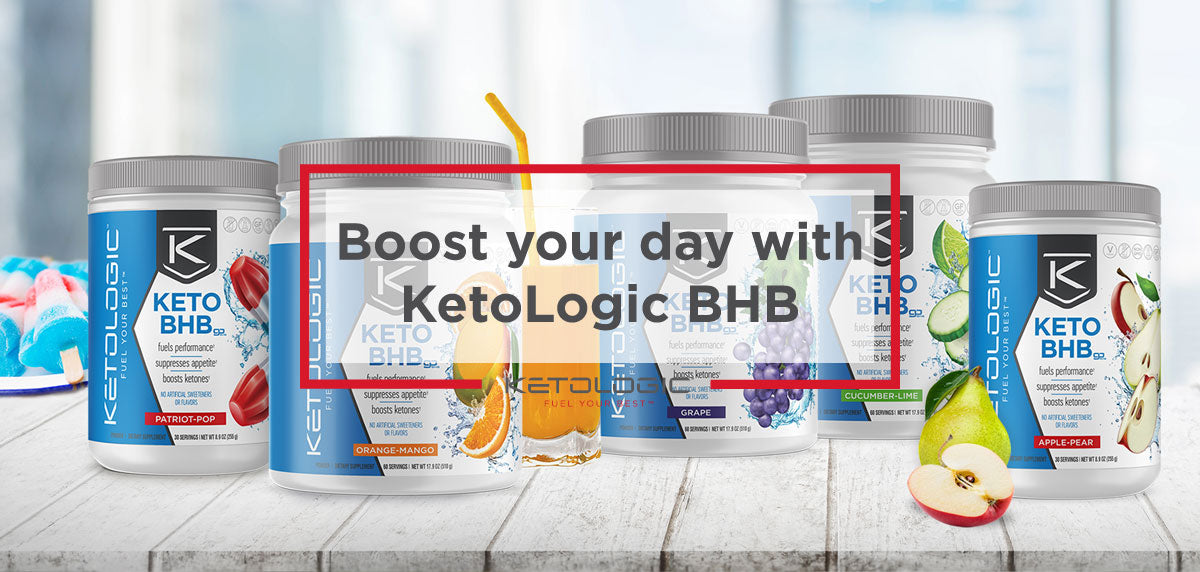Intermittent Fasting and Keto: Your Quickstart Guide

That's because fasting may help support ketosis and helps the goals of the ketogenic diet, such as weight loss, mental clarity, and other health benefits.

KetoLogic BHB Exogenous Ketones
KetoLogic® BHB is a great tasting and refreshing source of exogenous ketones, which can support ketosis and weight management. Shop BHB Now
What is Intermittent Fasting (IF)?
Intermittent Fasting more accurately describes an “eating pattern” than a “diet.” With IF, you cycle between periods of fasting and eating. It doesn’t dictate what to eat; it dictates when to eat.Is Intermittent Fasting Safe?
You’ve probably heard that to keep your metabolism chugging along, you should eat every 3-4 hours. But going through periods of fasting is actually more “natural” than eating every few hours. That’s because our ancestors (the hunter-gatherer ones) didn’t have the convenience of 24/7 access to food. They didn’t have restaurants, grocery stores, or refrigerators. They sometimes had to go extended periods of time without food due to availability. Fasting is also a part of religions, including Islam and Buddhism. In other words, humans are physically able to function without food for extended periods of time.How to do Intermittent Fasting?
- The 16/8 Method: Skip breakfast and restrict eating period to 8 hours. Many people eat from 1 p.m. to 9 p.m. then fast the other 16 hours. This is the most popular method because you’re asleep for about half of the fasting period, and breakfast is the easiest meal to skip (for most people).
- The 5:2 Diet: Eat only 500 to 600 calories a day during two non-consecutive days a week. Eat normally the other 5 days.
- Eat-Stop-Eat: Fast 24 hours once or twice a week. This is easy to adapt for your schedule, but can be harder to sustain. An example would be eating dinner at 6 p.m. then not eating again until dinner the next day.
- Alternate-Day Fasting: Fast every other day. Some forms of this method allow for up to 500 calories on fasting days.
- The Warrior Diet: Fast during the day, then have a huge dinner. Small amounts of raw fruits and vegetables during the day are allowed.
- Spontaneous Meal Skipping: As the name suggests, this method of fasting involves skipping meals when you’re not hungry or are too busy to eat.
The Benefits of Intermittent Fasting
While weight loss is the most highly touted one, research shows IF offers many other health benefits.- Increased metabolic rate: the combination of eating fewer total calories while burning calories at a faster rate can make IF an effective weight loss method [1]
- Increased levels of Human Growth Hormone (HGH): higher HGH levels can aid fat loss and enhance muscle gain [2]
- Lower levels of insulin: this makes stored body fat more accessible and may reduce the risk of Type 2 Diabetes [3]
- Enhanced cellular repair: this may offer anti-aging benefits and improve longevity [4, 5]
- Increased release of norepinephrine: this hormone aids in burning fat [6]
- May reduce inflammation [7]
- May reduce LDL cholesterol and other factors that contribute to heart disease [8]
- May help prevent cancer [9]
- May improve brain health and protect against Alzheimer’s Disease [10]
The Risks of Intermittent Fasting
For some people, Intermittent Fasting may not be beneficial, and could even be harmful. Consult your doctor prior to fasting if you:- Have diabetes
- Have low blood pressure
- Take medication
- Are trying to conceive
- Are pregnant
- Are nursing
- Are underweight
- Have an eating disorder (or have had one in the past)
Drinks and Approved Foods During Intermittent Fasting
Water, coffee, tea, and other non-caloric beverages are fine. Coffee can help suppress your appetite so is popular during fasts. Avoid adding sugar to your coffee. A little bit of heavy cream is okay. The general rule of thumb is to keep it under 50 calories.Supplementation and Intermittent Fasting
It’s not only okay to take supplements, but it could also help you feel better. Exogenous ketones are an example of a supplement that can help during intermittent fasting. Here’s how they can help:- Enhance weight loss. Ketone supplements, such as KetoLogic BHB, in conjunction with a low-carb/high-fat (LCHF) diet, can help you achieve a state of ketosis, which can aid weight loss. It’s important to clarify that ketone supplements do not cause weight loss; instead, they cause your body to enter a state where it uses fat as its primary source of fuel. For those on a ketogenic diet, this usually translates to weight loss if the ratio of fat/protein/carb consumption is enough to induce ketosis.
- Provide energy and prevent lethargy. Another reason to take ketone supplements during fasting is that it can boost your energy levels when you’re feeling hungry or lethargic. KetoLogic BHB is a refreshing and re-energizing drink during afternoon slumps or after workouts.
- Help suppress appetite. Lastly, ketone supplements can help with all those hunger pangs from fasting. It reduces your appetite and helps curb cravings.
Many people will make keto "bulletproof" coffee with MCTs, coconut oil, or ghee or butter. This promotes mental focus and satiety while still providing some of the benefits of fasting and ketosis. The term for this is called "fat fasting" and there are a great many people who follow this protocol and report similar effects to full-on IF.
Intermittent fasting is just one of many methods that can help you lose weight and lead a healthier life.
But always remember that eating real (unprocessed) foods, staying hydrated, exercising regularly, and getting adequate sleep are the most important factors for health and wellness.

***
Looking for keto recipes to enjoy when you're not fasting? Find tons of great recipes here.
New to keto and want to jumpstart your weight loss? Take the KETO 30 Challenge!
Need a sugar-free boost during your fasting periods? Try KetoLogic BHB!
Resources:
[1] https://www.ncbi.nlm.nih.gov/pubmed/2405717
[2] https://www.ncbi.nlm.nih.gov/pmc/articles/PMC329619/
[3] http://www.sciencedirect.com/science/article/pii/S193152441400200X
[4] https://www.ncbi.nlm.nih.gov/pmc/articles/PMC3106288/
[5] https://www.karger.com/Article/Abstract/212538
[6] https://www.ncbi.nlm.nih.gov/pubmed/2405717
[7] https://www.ncbi.nlm.nih.gov/pubmed/17291990/
[8] https://www.ncbi.nlm.nih.gov/pubmed/19793855
[9] https://www.ncbi.nlm.nih.gov/pubmed/3245934
[10] https://www.ncbi.nlm.nih.gov/pmc/articles/PMC151440/
-
Posted in
Authority Article, Nutrition, Nutrition Article, Training, Weight Loss






